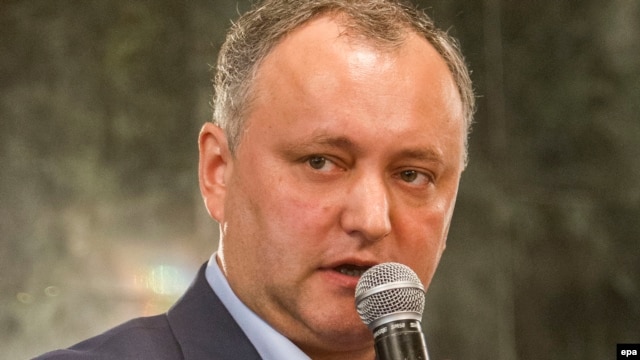Moldovan protest leader accuses U.S. of 'unification plot,' hails Soviet past
| Publisher | Radio Free Europe/Radio Liberty |
| Publication Date | 4 February 2016 |
| Cite as | Radio Free Europe/Radio Liberty, Moldovan protest leader accuses U.S. of 'unification plot,' hails Soviet past, 4 February 2016, available at: https://www.refworld.org/docid/56c4299c11.html [accessed 4 June 2023] |
| Disclaimer | This is not a UNHCR publication. UNHCR is not responsible for, nor does it necessarily endorse, its content. Any views expressed are solely those of the author or publisher and do not necessarily reflect those of UNHCR, the United Nations or its Member States. |
February 04, 2016
By Eugen Tomiuc and Merhat Sharipzhan
 Moldova's Socialist Party chairman Igor Dodon (file photo)
Moldova's Socialist Party chairman Igor Dodon (file photo)
One of the pro-Moscow leaders of recent antigovernment protests in Moldova has made anti-U.S. remarks that appear to be aimed at tapping into east-west tensions to whip up support for early elections that could boost Kremlin influence in his country.
Socialist Party chairman Igor Dodon accused Washington of pressing for the "terrible scenario" of the unification of Moldova and Romania and urged a return "home" of tiny, politically fraught Moldova "back in the U.S.S.R." through membership of the Russia-led Eurasian Economic Union.
Dodon and some unlikely allies are currently fighting for fresh elections that polls suggest would favor pro-Moscow forces, potentially bolstering Russia's influence in a state that borders the European Union and NATO.
Street protests peaked in late January after lawmakers approved a new pro-European government led by Prime Minister Pavel Filip but have ground mostly to a halt aside from a small tent camp in the capital, Chisinau.
The tensions, which included the storming of parliament by angry demonstrators, follow a year of political turbulence since revelations in late 2014 that more than $1 billion – or around one-eighth of Moldova's gross domestic product – disappeared from the banking system.
In an interview with Russian daily Komsomolskaya Pravda on February 3, Dodon claimed that Moldovan authorities had received "carte blanche from the West to use force" in their efforts to maintain control.
Dodon added that despite "hatred, and a passionate desire to overthrow the government," he and the leaders of the pro-Russian Our Party and the pro-European Dignity and Truth party leading public protests cannot reach a common position.
Dodon suggested the pro-Russian protest camp is advocating patience in order to avoid provocations, while its pro-European counterparts are more impatient to force change.
"Nobody wants blood, but the clock is ticking," Dodon told Komsomolskaya Pravda.
He blamed the United States and its NATO ally Romania for abetting the political crisis plaguing Moldova, one of Europe's poorest countries.
"Why invest [money] in tiny Moldova, why get involved in her problems and save her from starvation?" Dodon asked rhetorically, adding, "Now the Americans have another, much more terrifying project, called 'Unirea 2018'" – Romanian for Unification 2018 – "the merger of Moldova with Romania to mark the centenary of the Grand Unification of 1918."
The U.S.S.R. incorporated the former Romanian province of Bessarabia during World War II, turning most of its territory into the Soviet republic of Moldova but also granting part to Soviet Ukraine. Both Moldova and Ukraine became independent in 1991.
The topic of unification is an emotionally charged one between the two countries, which share a common history and language.
Dodon warned that any Moldovan unification with Romania would trigger a regional conflict pitting Romanian and Ukrainian troops on one side against Russian troops – currently stationed in Moldova's separatist region of Transdniester – on the other.
"This is what the United States is hoping for," Dodon said, without offering details, adding that such a "tragedy" would spread conflict well into the European Union – with whom Moldova signed an association agreement in 2014, much to the annoyance of Moscow.
Dodon said the only way back to the "fairytale times" of Soviet prosperity is through the Eurasian Economic Union, which includes Belarus, Armenia, Kyrgyzstan, and Kazakhstan along with Russia.
"We want to go home," Dodon said. "Back in the U.S.S.R."
Link to original story on RFE/RL website
